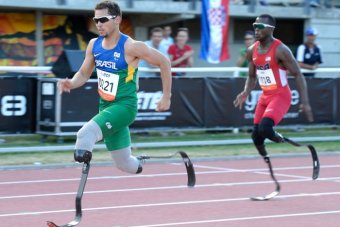
The sporting world enforces strict regulations surrounding the use of drugs, but Professor Roger Pielke Junior says there is little regulation around athletes physically altering their bodies in order to gain an edge.
Professor Roger Pielke Junior, director of the Sports Governance Centre at the University of Colorado, said the future could be one with “super athletes”, who have fused their bodies with technology in a “Terminator fashion”.
He said one of the more common procedures athletes were undergoing was eye surgery.
“So if you’re a baseball player in the United States or a tennis player or a golfer, or even a shooter in the Olympics, you’re going to want to have fairly good visual acuity,” he said
“And when athletes get their eyes lasered it’s not like when I got mine to 20-20. They’ll even go to 20-8, the limit of human ability to see.”
And at the moment those types of “technological enhancements” are allowed by elite sports, Professor Pielke Junior said, with very few rules or regulations surrounding them.
“So if you’re a skier and you’re an elite skier and you tear your anterior cruciate ligament, you can have that replaced with a synthetic ligament that’s better than the original.”
Fighters ‘having their facial skin replaced with cadaver skin’
A more extreme example, Professor Pielke Junior said, was the use in some combat sports of technology that did not exist until recently — fighters having the skin on their face peeled back, and their bones shaped down so they were “nice and smooth”.
“So when you get punched you’re less likely to bleed,” he said.
“Some fighters, and this is really happening, have even had their facial skin replaced with cadaver skin, so that it’s fresh and new and doesn’t bleed as much.
“This raises questions about well, should there be rules like for doping? About what’s allowed, what’s not allowed?”
He said another possibility for the future would be medical doctors altering human genetics.
“So that we might be able to have genetically modified humans in the future who are selected for their athletic performance,” he said.
“Given what we’ve seen over the last year, it’s not unreasonable to think that a nation, a state, may engage in a program to create super-humans for athletic purposes, to bring home those medals for geopolitical purposes.”
He said it was not unrealistic to perceive of a future where humans were even developed before birth to be good at a particular sport.
“It’s not unrealistic given that some nations have even encouraged elite athletes to marry, have children, in hopes of producing offspring that will in the next generation dominate the Olympics,” Professor Pielke Junior said.
Paralympics to be where ‘technology fuses with the human form’
Professor Pielke Junior cited South African runner Oscar Pistorius’ request to run with able-bodied athletes as one of the first cases of someone “pushing the boundary”.
“It raised some questions, if you run on prosthetic legs — and he was born without lower legs — which should the rules be?” he said.
“Sport wants to be inclusive, wants people to participate, but also wants to be fair.
“So that was really the start of some very difficult questions about what it means to have athletes who are not fully human in their capabilities participating in sport.”
Professor Pielke Junior, who has written soon-to-be released book The Edge: The War Against Cheating and Corruption in the Cutthroat World of Elite Sports, said sporting bodies “really haven’t” begun to grapple with what the future could bring.
“And when paralympians — who we used to consider to be disabled athletes — start doing superhuman things then it’s really going to raise real challenges and questions for the Olympics, track and field in particular,” Professor Pielke Junior said.
“I think in coming decades, people are going to tune into the Paralympics to see human beings doing things that you just can’t see in the Olympics.
“They will run faster, they will jump farther, they will do incredible things because that is the place technology fuses with the human form.”
He said sport was in many ways a reflection of the rest of society and a “wonderful place to experiment and ask questions about ethics”.
“Sport is going to be a place where we will have to take a look at what it means to be human, what it means to compete, what is fair, and all of the questions we have in broader society we’ll see play out in sporting competition.”
